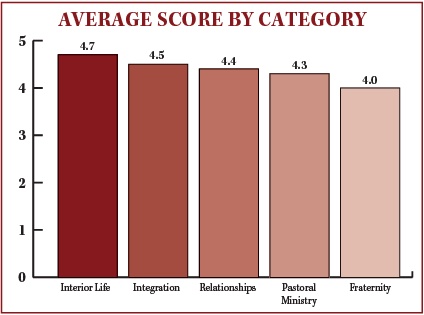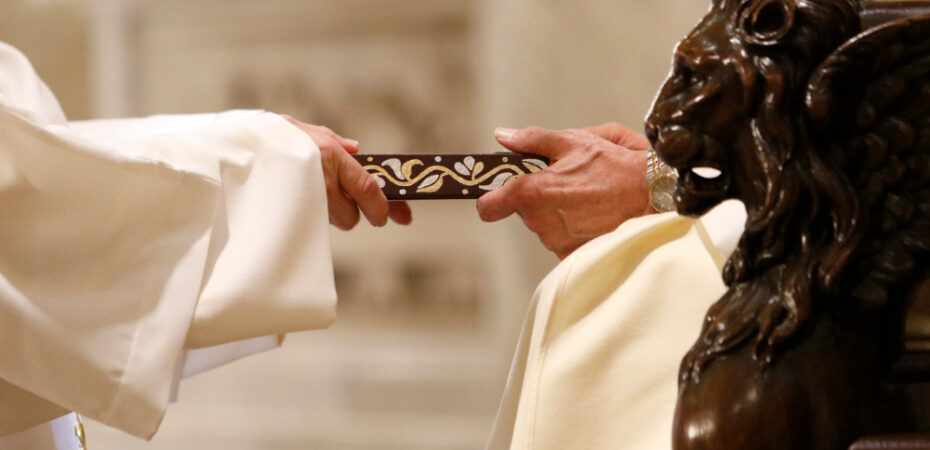New Study Explores the Well-Being of the Diaconate
Serving others and growing closer to Jesus is the greatest joy in living a fully integrated life as a deacon
Dr. Christina Lynch 1
With the help of several highly devoted deacon advisers from around the United States, the Spitzer Center for Visionary Leadership (SCVL) created a Diaconal Culture Inventory (DCI) to assess the health and happiness of permanent deacons.
The Spitzer Center has been collaborating with priests and presbyterates from numerous dioceses around the country for several years now. Our Presbyteral Culture Inventory (PCI) has confirmed empirically that (1) our clergy feel overwhelmed and fear burnout, (2) priestly fraternity is lacking in many areas, and (3) many priests are discouraged that parishioners have been slow to return to church since the COVID-19 dispensations. The Spitzer Center understands that the well-being and happiness of priests and deacons are crucial to the health of the Church.
On March 7, 2022, the DCI was sent to all members of the National Association of Diaconate Directors. We received 84 responses. Each deacon director took a 95-question survey. The survey included multiple choice (five-point scale), binary (yes/no), rankings (percentages) and open-ended questions. The open-ended questions generated almost 1,900 comments.
The survey assesses the current culture of the diaconate in five areas:
• Interior life (spiritual formation).
• Fraternity (among both priests and deacons).
• Relationships (spouse, family, parish staff, parishioners).
• Pastoral ministry (service, teaching, preaching).
• Integration (ministry, marriage, family life, secular work).
Interior Life (Spiritual Formation)
“Since becoming a deacon, I have grown in greater intimacy with Christ the Servant” (4.74/5.00).
The interior life of the deacon directors is their strongest dimension. Every respondent expressed faith in the real presence of Jesus in the Eucharist (5.0/5.0). Most of the deacons indicated they make an annual retreat (98%), most have a spiritual director (75%) and most take 15 to 30 minutes in daily prayer or spiritual development (83%).
Fraternity
“Since being named the director of the permanent diaconate, I have been fostering improved communication and more intentional gatherings.”
While fraternity among brother deacons is a strength (4.00/5.00), a fraternal spirit among priests and deacons is a struggle (3.35/5.00). Fortunately, deacons reported that they have personally experienced encouragement from a brother deacon resulting in an improved sense of diaconal identity and mission (4.67/5.00). Many deacon directors are intentionally addressing the need for better fraternity. Deacons reported that their greatest challenge regarding fraternity is a lack of communication with their bishop (3.08/5.00). They desire a better forum for bringing up problems and proposing solutions.
Relationships
“My diaconate strengthens my interpersonal relationships” (4.56/5.00).
 Most deacons claim to have a trusting relationship with their pastor (4.59/5.00). They do not agree, however, that they are understood and appreciated in their ministry within the presbyterate (3.54/5.00). Deacons attest that their ministry has strengthened family relationships (4.34/5.00). They report that being a deacon has benefitted their marriages (4.56/5.00). Wives that support their husband’s ministry (4.81/5.00) have also experienced positive changes in their own lives (4.61/5.00). In addition, those with secular jobs reported that being a deacon has improved their relationships at work (4.39/5.00).
Most deacons claim to have a trusting relationship with their pastor (4.59/5.00). They do not agree, however, that they are understood and appreciated in their ministry within the presbyterate (3.54/5.00). Deacons attest that their ministry has strengthened family relationships (4.34/5.00). They report that being a deacon has benefitted their marriages (4.56/5.00). Wives that support their husband’s ministry (4.81/5.00) have also experienced positive changes in their own lives (4.61/5.00). In addition, those with secular jobs reported that being a deacon has improved their relationships at work (4.39/5.00).
Pastoral Ministry
“I am blessed that all my training and work experience that have honed natural gifts have come together in my calling as a deacon.”
Most deacons have a high degree of confidence in their ministry, particularly when it comes to preaching (4.63/5.00) and acting in the person of Christ the Servant (4.53/5.00). They also admitted that they could benefit by receiving more training in preaching the Word of God (3.98/5.00). Deacons regularly engage in both spiritual (4.41/5.00) and corporal (4.17/5.00) works of mercy. Overall, there is a sense that they are flourishing in their ministry (4.45/5.00), but sometimes the demands can be overwhelming (3.75/5.00). Deacons desire to collaborate more with their pastors and bishops and to contribute more of their practical/professional skills in addressing the needs of the diocese (82%).
Integration
“Diaconal life is integrated because the deacon is my identity, and my mission is Christ the Servant.”
Deacons are able to integrate their ministry into the other various aspects of their lives (4.47/5.00), especially family life (4.47/5.00) and employment (4.51/5.00). Their greatest challenges to integration are time management, energy loss and overcommitment. These challenges can disrupt the proper balance of family, work, ministry and self-care. Many deacons, like priests, are tempted to functionalism, which weakens their diaconal identity (3.91/5.00). Deacons understand and reported that “living a fully integrated life as a deacon is their greatest joy.”
CHRISTINA LYNCH, Psy.D., is a clinical psychologist and consultant for the Spitzer Center for Visionary Leadership serving bishops, priests and deacons.
…………………………………………………………………………………………………………………………………………………
Strengths
• A positive interior life, with a commitment to the Liturgy of the Hours, spiritual growth, and a unanimous belief in Jesus’ presence in the Eucharist.
• Individual relationships with brother deacons.
• Positive impact of diaconal ministry on relationships.
• Overall sense of confidence in their diaconal ministry.
• Embracing the heart of a servant.
………………………………………………………………………………………………………………………………………………….
Challenges
• Poor fraternity with priests.
• Lack of communication with the bishop.
• The opportunity to contribute more of their skills and experience with the diocese.
• A need for ongoing formation in homiletics, theology and spirituality.
• Lack of qualified and available spiritual directors.
• Managing the tension between “being” and “doing” (functionalism).
………………………………………………………………………………………………………………………………………………….






Comments are closed.